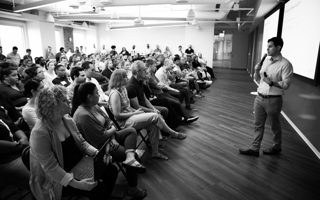The battle lines have been drawn. Yet instead of armored knights, war horses and wooden catapults, there are regimented rows of counter offers, wagons full of company culture and a fervent expectation for indefinite remote work.
Welcome to the tech world’s talent war of 2021, and you’d be forgiven for thinking things are getting medieval. Yet when attrition is the likely result of an evenly-matched battle, creative and agile thinking is required for success.
That’s why Chicago’s OppFi has learned new strategies to succeed in the recruitment and retention challenge that has pulled just about every company into a whirlwind of uncertainty, churn and frantic, mish-mashed strategy.
“Remote flexibility is not only huge, it’s actually table stakes,” said Chief People Officer Karishma Patel Buford. “If you don't do it — if you don’t offer remote work — you’re going to have a real loss. You’re not going to be able to attract talent. I think the bigger challenge is figuring out how to keep the company culture and connection alive.”
Yet Patel Buford and Vice President of Talent and DEI Michelle Y. Bess know that winning the talent war goes far beyond remote work and culture. When scandalous counteroffers are flying over the heads of recruiters like projectiles from hulking siege weapons, the solution is to think outside the box — or to find a way, like OppFi did, to leverage the resources gained by going public.
We sat down for an extended, engaging discussion with Patel Buford and Bess about the new and unique strategies OppFi is using to attract new talent, keep current talent and bring their company out of 2021’s talent war not only unscathed, but stronger than ever before.

What in the world is going on this year? Why is recruitment and retention such a challenge in 2021, and how does The Great Resignation factor in?
Karishma Patel Buford: The biggest challenge right now is that it’s a talent war.
We know that the pandemic meant that there was a lot of pent-up attrition pending. And we’re facing that this year — we’ve had more attrition this year than in the previous three years combined, particularly in terms of regretted attrition, which means people who we do not want to lose. There are lots of opportunities out there, and it’s a total supply and demand situation. The supply of jobs is so much bigger because of all the jobs that were held or paused in 2020 versus the demand of candidates out there. So we have candidates coming in with three other offers, or they’re coming in starting their first interview and are in the last interview stage at four other places. It’s just so hyper-competitive.
Some of the best are choosing to start their own companies or find a company that will prioritize DEI in their actions, not just words.”
Michelle Y. Bess: Following the murder of George Floyd, our country and corporations have been forced to think about diversity, equity and inclusion in a different and more urgent way. So the recruitment and retention of underrepresented employees — particularly Black employees — has been challenging. That’s because every company is looking to hire Black employees, and the market is so hot for talented Black employees and leaders that they can take their pick on where to go. And then there is the reality that many Black employees have relished being at home, where they can be their authentic selves more regularly, aren’t reminded that they are the only Black person in the office and do not face microaggressions daily, as they did in the office. So for one of the most sought after groups of people from last year, competition is even more fierce, because some of the best are choosing to start their own companies or find a company that will prioritize DEI in their actions, not just words.
Is this hyper-competitive market our new reality? And if so, what are the specific challenges you and others are facing?
Patel Buford: I think the market in this situation — just like the market always does — is overcorrecting for 2020. This is not going to be our new world forever. But it will take 12 to 18 months for the situation to stabilize into a normal candidate market again. In the interim, that means you’re competing with oversized counteroffers — we will make an offer to a candidate and then another company says, “Hey, we’ll give you double that.” Candidates are also getting jobs at multiple levels above their current capability and readiness. If they are high potential, they will crush it. If they are not, those companies who are hiring aggressively without an objective and robust assessment process will see those performance gaps play out in the next year.
The “SPAC rage” — companies going public via special purpose acquisition companies — has increased exponentially over the last 12 months. So we’re not the only ones who’ve gone public and have that as an incentive. Competing with that aspect has been equally challenging, and yet companies that go public have more resources available to attract and retain talent.
From a generational perspective in particular, the ability to inspire others and create a sense of purpose and mission is that much more important. So we are striving to equip our leaders to share our story, our vision and how they would contribute to our future when they’re talking to candidates. Our offer acceptance is still 85 percent compared to our 85 percent target, and we’re proud that even in this environment, we’ve been able to keep that up despite some of these really new challenges.
Bess: As I mentioned before, I also think for everyone who applies for jobs, there’s just this deep desire to be full-time remote. I think all companies are seeing that and I think we’ve addressed that in a really great way.
We have a campaign called “Thrive Where You Work, Work Where You Thrive.” That’s part of what’s allowed us to remain competitive — we have a remote-flexible culture, whereas other companies are still saying everyone needs to come into the office despite the pandemic, despite the delta variant and so on. As someone who was onboarded during the pandemic, feeling connected to the company and the culture through this remote-flexible environment is something that we are keeping top of mind.
While there are people who really love their jobs and want to work, what we’re seeing across industries is that there are some people who don’t want to come back to corporate at all. Some people have decided they just want to work for themselves. I was listening to this podcast, and other people are doing these mini retirements. People are taking breaks, taking time to reassess, recharge and regroup. And so the talent war at this point is really intense, and there are a lot of different things that are impacting it versus just trying to compete with other companies.

How are some of these recruitment and retention challenges solved by becoming a public company?
Patel Buford: I think the beauty of becoming a public company is that everyone can have skin in the game and everyone can be an owner. That’s not the case as a private company, right? So from an equity standpoint alone, we made the decision by influencing the board to give everyone equity when we went public, and that’s not a market practice. The market practice is to have some sort of cash-based reward when going public, but we decided to do both and give everyone both a cash-based award and an equity grant because we want people to grow with us for the long-term and have investment and ownership in helping us become a $10-billion company.
What this also means is that every new hire at every level will get equity, which is also not market practice. The current market practice is that directors and above get equity. For every new hire at every level in every job to get equity is rare, and there are very few companies who will do that — less than 10 percent of companies. The goal is truly to drive that ownership mindset and get each employee to act like an owner. We’re really proud of our ability to do that, and I think that’s also why we’ve been able to keep up that offer acceptance rate.
Every new hire at every level will get equity, which is not market practice.”
Bess: This isn’t necessarily related to becoming a public company, but something we’re looking forward to building out and highlighting more is a comprehensive talent management process. I was so impressed when I came to OppFi to see that even as a private company, we had a talent and compensation philosophy. As a public company that is growing, there is even more of an expectation and necessity to have a strong performance review, talent review and succession planning processes. Having these processes in place, optimized and ensuring that all employees know and understand them helps us support career growth and development and guarantees we’re identifying and supporting the next generation of OppFi leaders internally. When employees know what is possible for them, receive regular coaching and feedback, and feel invested in company growth as owners and leaders, the result is a winning combination that allows for strong retention.

If remote work is just table stakes, what’s the next level of innovation when it comes to physical offices?
Patel Buford: I was talking to one of our recruiters yesterday who is in the office right now with four other people. Our office is built for 400. She said it was lonely and isolating. It’s almost like déjà vu — we’re worse off now than we were a year ago with this pandemic. So one of the things we want to do is create team experiences and team days in the office. We’ve been thinking about how to create meaningful connections and powerful collaboration experiences, and find new ways to use the office. We think this is also going to be a very compelling attraction for future candidates in ways that will allow us to differentiate ourselves. And that’s not tied so much to going public, but it’s tied to remote flexibility and how we can become one of the best remote flexible companies, not only in Chicago but across the country.
Creativity and agility is how we’ve learned to succeed.”
What’s an example of OppFi using a unique strategy or the resources of a public company to win the talent war?
Patel Buford: In terms of retention, there was an individual on one of our teams who got another job offer. And this is what we’re seeing — people are coming to us when they have the job offer in hand. Because this person was high potential, a senior leadership team member actually came to me and said, “What other opportunities can we find for this person?”
You may have read about OppFi moving from our core installment loan product, OppLoans, to a financial platform of multiple products, including OppFi Card, a credit card, and SalaryTap, an employer payroll-linked loan product. And so now that we’re building out these products, new opportunities are coming up. So we had some conversations with the internal leaders and in 48 hours we created a role for this person that was going to be filled in 2022. We actually pulled it up, we got finance approval and our talented employee stuck with us into a truly career-accelerating role. And that just would not have happened had we not been agile and creative and strategic. We could have been like, “Oh, well, this role is not budgeted for 2021.” But losing this person’s great skills and potential would have been a much greater loss in the long-term than the cost in the short-term. That creativity and agility is how we’ve learned to succeed, and driving this strategy for high potentials will be a critical lever in winning this war on talent.






